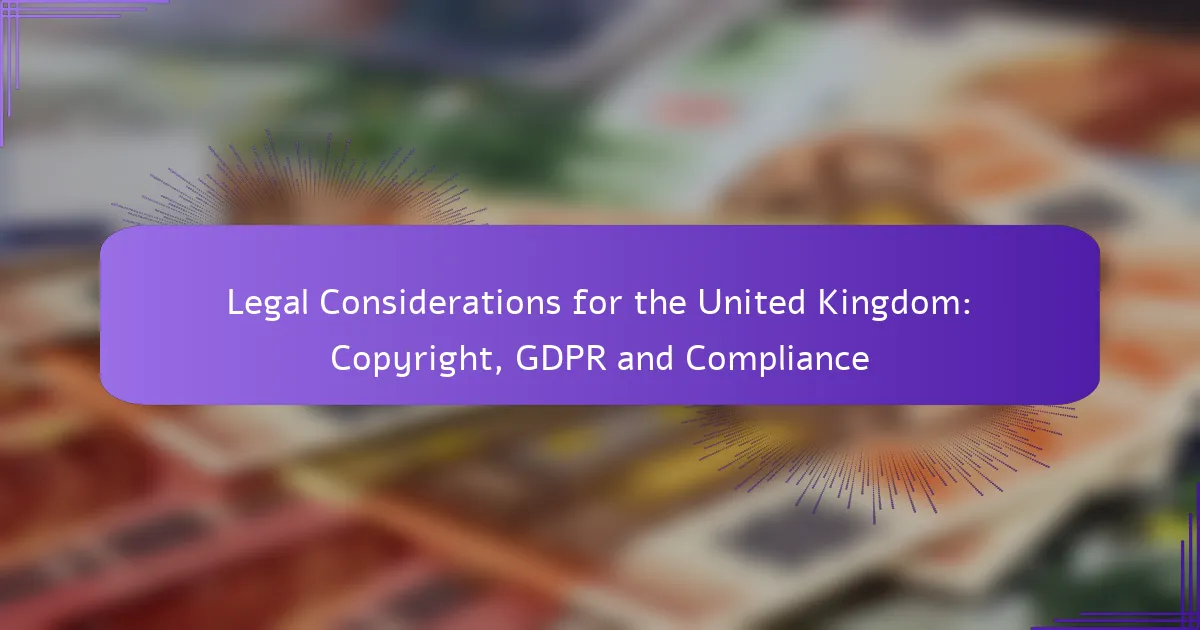In the United Kingdom, understanding legal considerations such as copyright law and the General Data Protection Regulation (GDPR) is crucial for businesses. Copyright law safeguards original works, while GDPR imposes strict data handling and privacy requirements. Compliance with these regulations not only protects intellectual property and personal data but also fosters trust with customers and upholds ethical business practices.
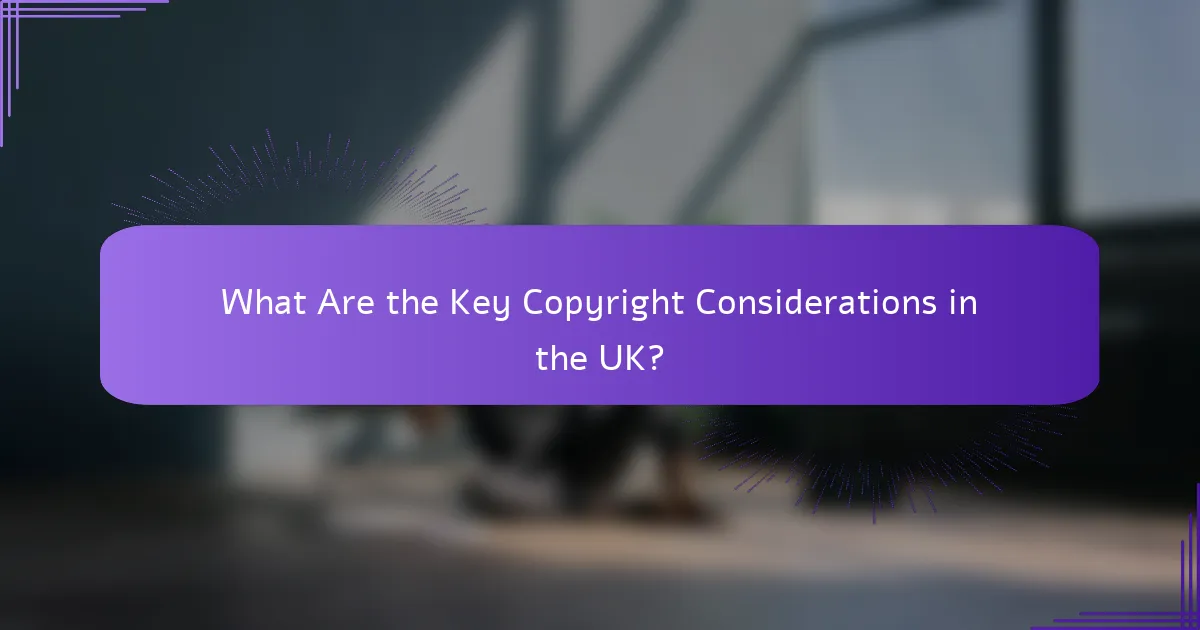
What Are the Key Copyright Considerations in the UK?
In the UK, copyright law protects original works, granting creators exclusive rights to use and distribute their creations. Understanding copyright ownership, duration, and exceptions is essential for compliance and protecting intellectual property.
Copyright Ownership in Digital Products
Copyright ownership in digital products typically resides with the creator unless a contract states otherwise. For instance, if a freelance designer creates a website for a client, the contract should clarify whether the designer retains copyright or transfers it to the client.
It’s crucial for businesses to ensure that any digital content they use, such as images or software, is either owned, licensed, or in the public domain. Failure to do so can result in legal disputes and financial penalties.
Duration of Copyright Protection
In the UK, copyright protection generally lasts for the life of the creator plus 70 years. For works created by companies, copyright lasts for 70 years from the date of publication or creation, whichever is earlier.
After the copyright expires, the work enters the public domain, allowing anyone to use it without permission. Creators should be aware of this timeline to manage their rights effectively and consider renewing or licensing their works as needed.
Exceptions and Limitations
The UK copyright law includes several exceptions that allow limited use of copyrighted material without permission. These include fair dealing for purposes such as criticism, review, and news reporting, as well as educational use in certain contexts.
Understanding these exceptions can help individuals and organisations use copyrighted materials legally. However, it is advisable to seek legal advice to ensure compliance and avoid potential infringements, especially in commercial contexts.

How Does GDPR Affect Digital Products in the UK?
The General Data Protection Regulation (GDPR) significantly impacts digital products in the UK by establishing strict guidelines for data handling and user privacy. Companies must ensure compliance with these regulations to avoid hefty fines and maintain customer trust.
Data Protection Principles
GDPR outlines several key data protection principles that organisations must follow. These include lawfulness, fairness, and transparency in data processing, as well as purpose limitation, data minimisation, accuracy, storage limitation, integrity, and confidentiality.
For example, businesses should only collect data necessary for their specific purpose and ensure it is accurate and up-to-date. Regular audits can help verify compliance with these principles.
Rights of Data Subjects
Under GDPR, individuals have specific rights regarding their personal data. These rights include the right to access their data, the right to rectify inaccuracies, the right to erasure (often referred to as the “right to be forgotten”), and the right to data portability.
Organisations must have processes in place to facilitate these rights, such as enabling users to easily request their data or delete their information. Failure to comply can lead to legal repercussions and loss of customer confidence.
Compliance Requirements for Businesses
Businesses operating in the UK must adhere to several compliance requirements under GDPR. This includes appointing a Data Protection Officer (DPO) if they process large amounts of personal data, conducting Data Protection Impact Assessments (DPIAs), and maintaining detailed records of data processing activities.
Additionally, companies should implement appropriate technical and organisational measures to protect personal data. Regular training for employees on data protection practices is essential to ensure ongoing compliance and to mitigate risks associated with data breaches.

What Are the Compliance Obligations for UK Businesses?
UK businesses must adhere to various compliance obligations, including copyright laws, GDPR regulations, and industry-specific standards. These requirements ensure that companies protect intellectual property, handle personal data responsibly, and maintain ethical practices in their operations.
Understanding Regulatory Frameworks
The regulatory frameworks in the UK encompass several key laws, including the Copyright, Designs and Patents Act and the General Data Protection Regulation (GDPR). Businesses must understand how these laws apply to their operations, especially regarding data protection and intellectual property rights.
For instance, under GDPR, organisations must obtain explicit consent from individuals before processing their personal data. This includes providing clear information about how the data will be used and ensuring that individuals can easily withdraw their consent.
Impact of Non-Compliance
Non-compliance with UK regulations can lead to significant consequences, including hefty fines and legal actions. For example, GDPR violations can result in fines of up to 4% of a company’s annual global turnover or €20 million, whichever is higher.
Additionally, businesses may suffer reputational damage, loss of customer trust, and operational disruptions. To mitigate these risks, companies should regularly review their compliance status, invest in staff training, and implement robust data protection measures.
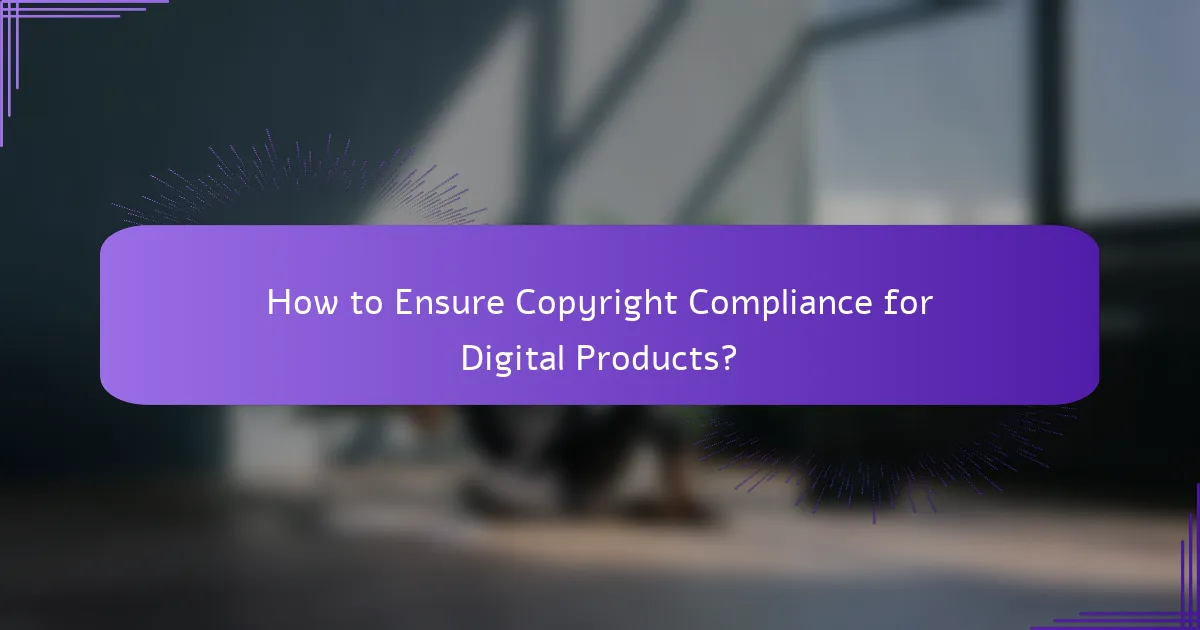
How to Ensure Copyright Compliance for Digital Products?
To ensure copyright compliance for digital products in the United Kingdom, it is essential to understand the legal framework surrounding intellectual property rights. This includes obtaining necessary licences, respecting the rights of original creators, and implementing measures to prevent infringement.
Best Practices for Licensing
Licensing is crucial for using copyrighted materials legally. Always obtain written permission from copyright holders before using their work, whether it’s images, music, or software. Consider using Creative Commons licences, which allow for specific uses under defined conditions.
When creating digital products, ensure you have clear agreements in place with any collaborators or contributors regarding ownership and usage rights. This helps prevent disputes and clarifies the scope of each party’s rights.
Monitoring Copyright Infringement
Regularly monitor your digital products for potential copyright infringement. This can involve using automated tools that scan the internet for unauthorised use of your content. Setting up Google Alerts for your brand or product names can also help you stay informed.
Establish a clear process for addressing copyright violations when they occur. This may include sending cease-and-desist letters or filing Digital Millennium Copyright Act (DMCA) takedown notices. Being proactive can protect your rights and deter future infringements.
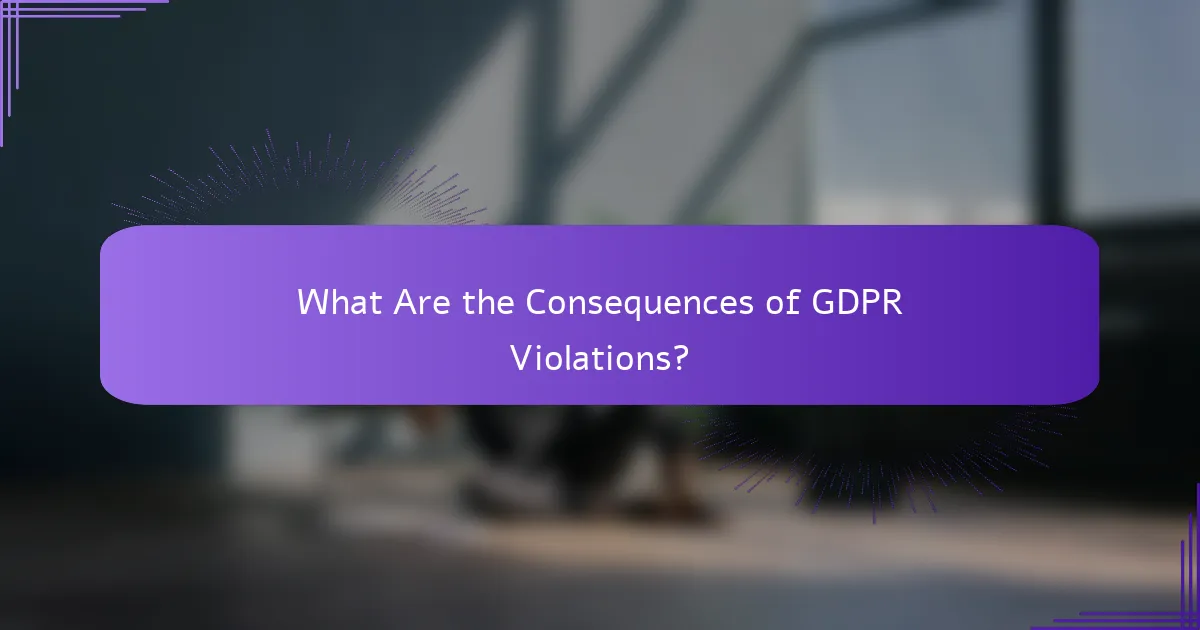
What Are the Consequences of GDPR Violations?
The consequences of GDPR violations can be severe, impacting both financial and reputational aspects of a business. Organisations found non-compliant may face hefty fines and damage to their public image, which can affect customer trust and loyalty.
Fines and Penalties
Fines for GDPR violations can reach up to 20 million euros or 4% of a company’s global annual revenue, whichever is higher. These penalties are tiered based on the severity of the infringement, with lesser violations attracting lower fines. Businesses should conduct regular audits to ensure compliance and avoid these costly penalties.
In addition to fines, organisations may incur legal costs associated with defending against claims or investigations. It is crucial to have robust data protection policies in place to mitigate these risks.
Reputational Damage
Reputational damage from GDPR violations can be long-lasting and difficult to recover from. Customers may lose trust in a brand that fails to protect their personal data, leading to decreased sales and customer retention. Negative media coverage can further amplify the damage, affecting public perception.
To safeguard reputation, companies should prioritise transparency and communication regarding data practices. Proactively addressing potential issues and demonstrating commitment to data protection can help maintain customer confidence and loyalty.

How to Create a GDPR Compliance Strategy?
Creating a GDPR compliance strategy involves understanding data protection requirements and implementing measures to safeguard personal data. Key steps include data mapping, staff training, and establishing clear policies for data handling.
Data Mapping and Inventory
Data mapping is essential for identifying what personal data your organisation collects, processes, and stores. Create an inventory that outlines the types of data, their sources, how they are used, and where they are stored. This inventory should be regularly updated to reflect any changes in data processing activities.
Consider using a simple table format to organise your data inventory, including columns for data type, purpose, storage location, and retention period. This will help ensure you have a clear overview of your data landscape and can easily identify areas that require compliance measures.
Staff Training and Awareness
Staff training is crucial for ensuring that all employees understand GDPR requirements and their role in maintaining compliance. Develop a training programme that covers key principles of data protection, including the importance of data security and the rights of individuals under GDPR.
Regular workshops and refresher courses can help keep staff informed about updates to regulations and best practices. Additionally, consider creating easy-to-understand materials, such as quick reference guides or infographics, to reinforce training and promote a culture of data protection within your organisation.
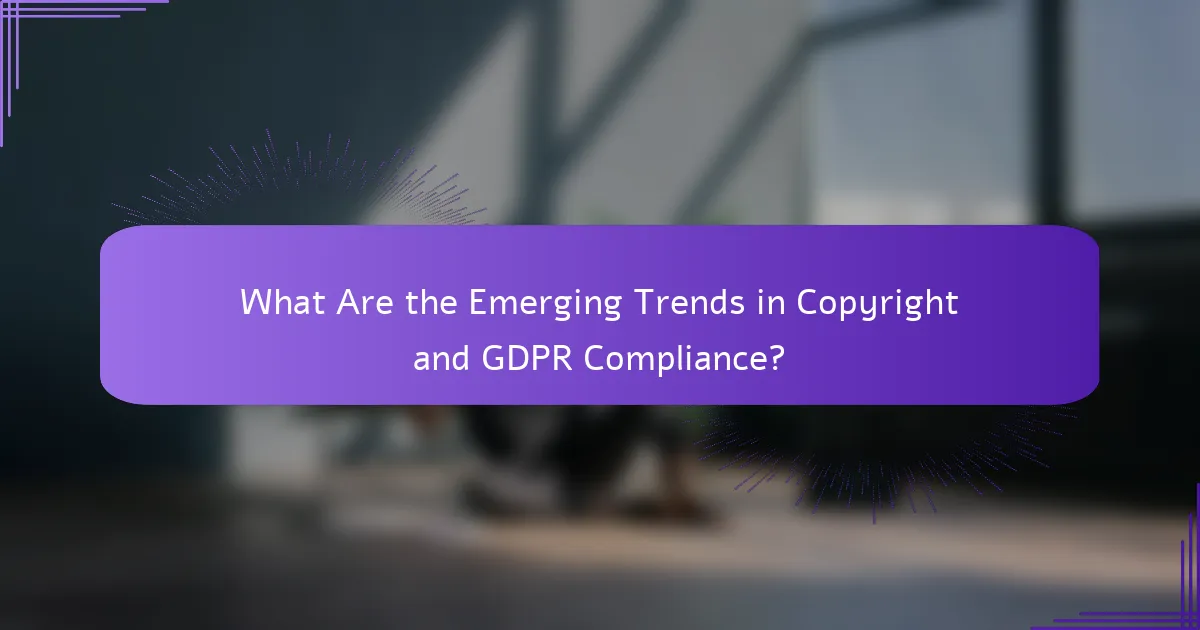
What Are the Emerging Trends in Copyright and GDPR Compliance?
Emerging trends in copyright and GDPR compliance reflect the evolving landscape of digital content and data privacy. Key developments include the influence of artificial intelligence on copyright law and the ongoing evolution of data privacy regulations in response to technological advancements.
Impact of AI on Copyright Law
The rise of artificial intelligence (AI) is reshaping copyright law, particularly in how creative works are produced and attributed. AI-generated content raises questions about authorship and ownership, as traditional copyright frameworks may not adequately address these new realities.
For instance, if an AI creates a piece of music or art, determining who holds the copyright can be complex. Stakeholders must consider whether the AI’s output qualifies for protection and who, if anyone, should be credited as the creator. Legal experts recommend staying informed about ongoing legislative changes in this area.
Future of Data Privacy Regulations
Data privacy regulations are continuously evolving, particularly in light of the General Data Protection Regulation (GDPR) in the UK and Europe. Organisations must adapt to stricter compliance requirements regarding data collection, processing, and storage to avoid significant penalties.
As technology advances, expect more regulations that address emerging threats to personal data, such as biometric data and AI-driven analytics. Companies should conduct regular audits of their data practices and ensure transparency with users about how their data is used and protected.
